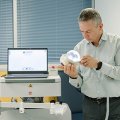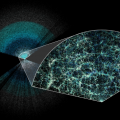
Research by The University of Queensland may provide a better understanding of the social functioning difficulties of people with autism.
A study led by UQ School of Psychology researcher Dr Daniel Skorich has shown a relationship between features of autism spectrum disorder (ASD) that were previously thought to be unrelated.
“Autism is a multi-faceted disorder characterised by distinct clusters of features,” Dr Skorich said.
“One of these clusters relates to the ability to share attention with others, and to focus attention on the objects or events on which someone else is focused. People with ASD show a decreased tendency to do this.
“A second cluster is related to information processing, where people with ASD process information in a less integrated manner, referred to as 'weak central coherence'.
“Our research suggests that weak central coherence actually causes the shared attention difficulties.
“We found that the information processing needed for self-categorisation—the process of coming to see oneself as interchangeable with other members of groups to which we belong—is weaker the more autistic-like traits a person possesses, which in turn predicts the decreased tendency to share attention.
“So it seems that the decreased tendency to see oneself as part of a group is at the heart of the differences people with ASD show in their social interactions with others.”
Dr Skorich said the research had implications for intervention.
“By linking ASD with self-categorisation, our research suggests that a social cure perspective on health and well-being, such as UQ’s Groups 4 Health program, could be adapted to treat the much higher rates of anxiety and depression seen in people with ASD,” he said.
Groups 4 Health, designed to help people develop, enhance and maintain their group-based social identification, has been shown to be effective in treating several mental health conditions.
Dr Skorich said UQ’s Secret Agent Society social skills program for children aged eight to 12 also could be useful.
The research is published in the Journal of Autism and Developmental Disorders.
Media: Dr Daniel Skorich, d.skorich@uq.edu.au, +61 7 3346 9506 and +61 431 169 042; Dani Nash, UQ Communications, dani.nash@uq.edu.au, +61 7 3346 3035.










